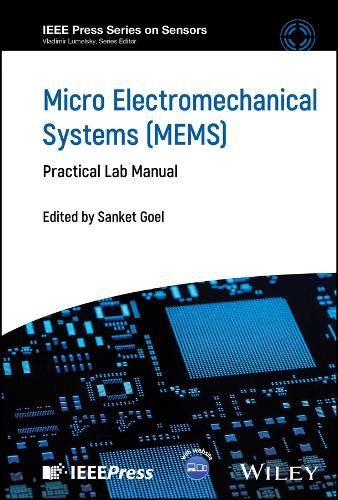Readings Newsletter
Become a Readings Member to make your shopping experience even easier.
Sign in or sign up for free!
You’re not far away from qualifying for FREE standard shipping within Australia
You’ve qualified for FREE standard shipping within Australia
The cart is loading…






Practical lab manual on the stepwise description of the experimental procedures of micro electromechanical systems (MEMS) devices
Micro Electromechanical Systems (MEMS) is a highly practical lab manual on the relevant experimental procedures of MEMS devices, covering technical aspects including simulations and modeling, practical steps involved in fabrication, thorough characterizations of developed MEMS sensors, and leveraging these sensors in real-time targeted applications.
The book provides in-depth coverage of multi-physics modeling for various sensors, as well as fabrication methodologies for photolithography, soft lithography, 3D printing, and laser processing-based experimental details for the realization of MEMS devices. It also covers characterization techniques from morphological to compositional, and applications of MEMS devices in contemporary fields such as microfluidics, wearables, and energy harvesters. The text also includes a foundational introduction to the subject.
The book covers additional topics such as:
Basic fluid flow and heat transfer in microfabrication, Y and T channel mixing, and simulation processes for Droplet generation Simulations based on cyclic voltammetry and electrochemical impedance spectroscopy, screen and ink-jet printing, laser-induced graphene, reduced graphene oxide, and 3D printing X-ray diffraction, scanning electron microscopy, optical microscopy, Raman spectroscopy, energy dispersive spectroscopy, and Fourier Transform Infrared (FTIR) Spectroscopy Experimental stepwise details to enable students to perform the experiments in the practical laboratory and future outlooks on the direction of the field
A practical guidebook on the subject, Micro Electromechanical Systems (MEMS) is a must-have resource for students, academicians, and lab technicians seeking to conduct experiments in real-time.
$9.00 standard shipping within Australia
FREE standard shipping within Australia for orders over $100.00
Express & International shipping calculated at checkout
Practical lab manual on the stepwise description of the experimental procedures of micro electromechanical systems (MEMS) devices
Micro Electromechanical Systems (MEMS) is a highly practical lab manual on the relevant experimental procedures of MEMS devices, covering technical aspects including simulations and modeling, practical steps involved in fabrication, thorough characterizations of developed MEMS sensors, and leveraging these sensors in real-time targeted applications.
The book provides in-depth coverage of multi-physics modeling for various sensors, as well as fabrication methodologies for photolithography, soft lithography, 3D printing, and laser processing-based experimental details for the realization of MEMS devices. It also covers characterization techniques from morphological to compositional, and applications of MEMS devices in contemporary fields such as microfluidics, wearables, and energy harvesters. The text also includes a foundational introduction to the subject.
The book covers additional topics such as:
Basic fluid flow and heat transfer in microfabrication, Y and T channel mixing, and simulation processes for Droplet generation Simulations based on cyclic voltammetry and electrochemical impedance spectroscopy, screen and ink-jet printing, laser-induced graphene, reduced graphene oxide, and 3D printing X-ray diffraction, scanning electron microscopy, optical microscopy, Raman spectroscopy, energy dispersive spectroscopy, and Fourier Transform Infrared (FTIR) Spectroscopy Experimental stepwise details to enable students to perform the experiments in the practical laboratory and future outlooks on the direction of the field
A practical guidebook on the subject, Micro Electromechanical Systems (MEMS) is a must-have resource for students, academicians, and lab technicians seeking to conduct experiments in real-time.